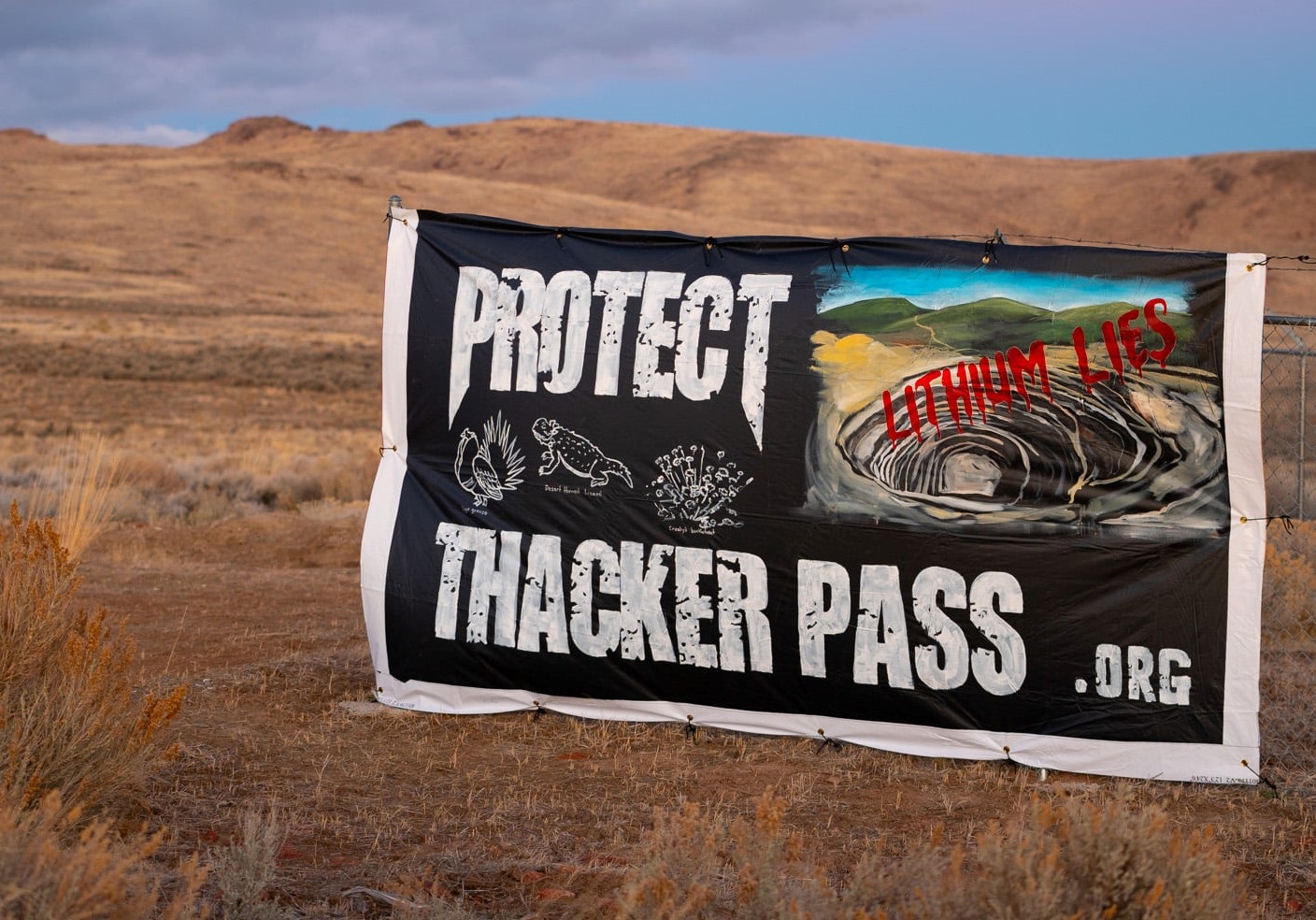
- Details
- By Darren Thompson
The lawsuit asks the court to ban seven individuals and environmental watchdog organization Protect Thacker Pass from the construction sites of the lithium project and demands they pay millions of dollars in damages.
Bhie-Cie (BC) Zahn-Nahtzu, Te-Moak Shoshone and Washoe from the Reno-Sparks Indian Colony, who was named in the lawsuit, spoke with Native News Online.
“As a defendant in the lawsuit that the Lithium Cooperation has filed against me, I have faith I did the right thing and will continue to let the universe and my ancestors guide me,” BC Zahn-Nahtzu said. “They can’t take my house, the land I live on, my kids, my art, my animals, or my plants, or anything that really matters to me.”
The Bureau of Land Management (BLM) approved the permit for Lithium Americas to construct a massive lithium mine worth more than $2 billion on Jan. 15, 2021. The Reno-Sparks Indian Colony, Summit Lake Paiute Tribe, and the Burns Paiute Tribe all filed suit against the project, saying that it would destroy a site they consider sacred.
The Thacker Pass region is considered sacred by the tribes who call it “Peehee Mu’huh,” or Rotten Moon in the Paiute language because, in 1865, federal cavalry killed more than 30 men, women and children and then left their bodies to rot. The three tribes that filed a lawsuit have wanted Thacker Pass to be listed on the Nation Register of Historic Places.
On March 23, the U.S. District Court ruled against the Tribes’ argument that the construction of the mine would prohibit their access for cultural reasons. Judge Miranda Du said in her ruling that the region has been restricted for years.
The lawsuit hopes to ban the defendants from the construction sites and require them to pay retribution to the company for times it had to halt construction allegedly due to activities of a non-violent prayer encampment called Ox Sam.
The camp is named after a survivor of the 1865 massacre and ancestor of Dorece Sam and Dean Barlese, two of the individual defendants in the lawsuit. The camp was raided and cleared by law enforcement on June 8. During the raid, a ceremonial fire was extinguished and sacred objects were displaced in trash bags.
“This lawsuit is targeting Native Americans and their allies for a non-violent prayer to protect the 1865 Thacker Pass massacre site,” said Terry Lodge, attorney working with the group. “These people took a moral stand in the form of civil disobedience. They are being unjustly targeted with sweeping charges that have little relationship to the truth, and we will vigorously defend them.”
Lithium Nevada Corporation (LNC), a subsidiary of Lithium Americas, said in a news release that it began constructing what is being touted as the largest lithium mine in North America on March 2. According to the company, lithium reserves at Thacker Pass can support the production of up to 1 million electric vehicles a year for up to 40 years. Production of materials could begin as soon as the end of 2026.
For filing the lawsuit, Lithium Nevada has been granted a Temporary Restraining Order against the defendants and “any third party acting in concert” with them from interfering with construction, blocking access roads, or being in the general area. The accused told Native News Online they are not involved in planning further protest activity at the mine site.
More Stories Like This
Gwich'in Tribal Governments Submit Comments Challenging Fish and Wildlife Service's Inadequate Environmental Review of Arctic Refuge Snow RoadRappahannock Tribe Challenges 9M-Gallon Water Plan
Feds release draft long-term plans for Colorado River management
Apache Leader Walks 60 Miles to Court Hearing That Will Decide Fate of Sacred Oak Flat
Rappahannock Tribe Raises Sovereignty and Environmental Concerns Over Caroline County Water Permit
Help us defend tribal sovereignty.
At Native News Online, our mission is rooted in telling the stories that strengthen sovereignty and uplift Indigenous voices — not just at year’s end, but every single day.
Because of your generosity last year, we were able to keep our reporters on the ground in tribal communities, at national gatherings and in the halls of Congress — covering the issues that matter most to Indian Country: sovereignty, culture, education, health and economic opportunity.
That support sustained us through a tough year in 2025. Now, as we look to the year ahead, we need your help right now to ensure warrior journalism remains strong — reporting that defends tribal sovereignty, amplifies Native truth, and holds power accountable.
 The stakes couldn't be higher. Your support keeps Native voices heard, Native stories told and Native sovereignty defended.
The stakes couldn't be higher. Your support keeps Native voices heard, Native stories told and Native sovereignty defended.
Stand with Warrior Journalism today.
Levi Rickert (Potawatomi), Editor & Publisher

